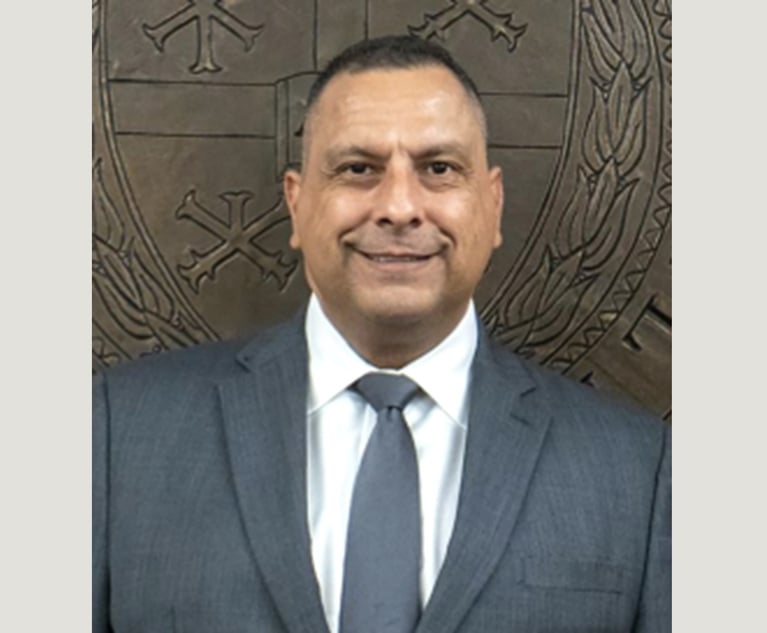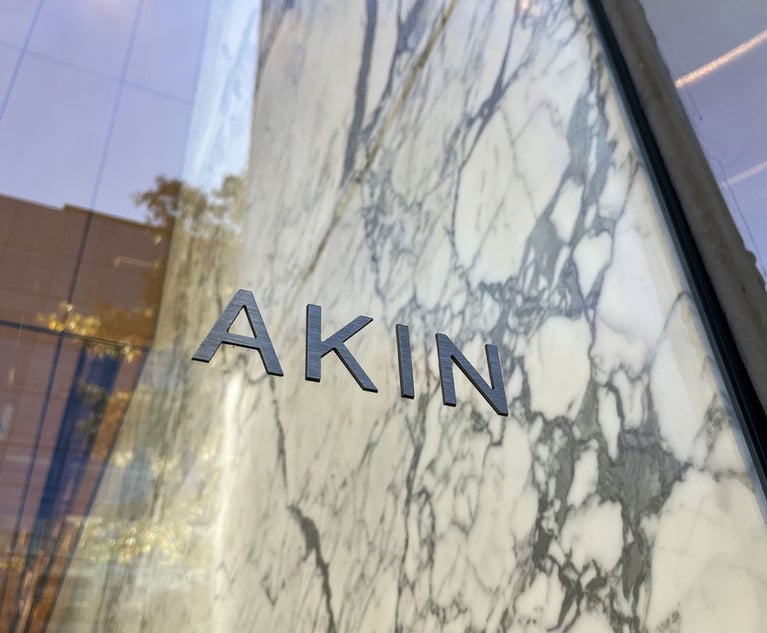 Philip Durst. Photo: Joel Salcido
Philip Durst. Photo: Joel SalcidoTexas Litigator Phil Durst Has Died: 'Many Thousands Will Mourn'
Attorneys say that Deats Durst & Owen partner Philip Durst, who died Tuesday, was a brilliant attorney in employment and civil rights law, a successful artist, and genuinely kind man whose sense of humor made a lasting impression on law partners, friends, clients and the wider legal community.
October 02, 2019 at 03:44 PM
5 minute read
Austin litigator Phil Durst, who gave the gift of laughter to countless appellate lawyers and law students with his hilarious legal teaching, died Tuesday after battling health problems in recent months. He was 63.
Attorneys are describing the Deats Durst & Owen partner's death as a devastating loss, not only because he was a brilliant attorney in employment and civil rights law, but also because he was a successful artist and genuinely kind man whose sense of humor made a lasting impression on law partners, friends, clients and the wider legal community.
"Many thousands of people will mourn him. He was well loved in the legal community and art community. He was one of Austin's great artists," said Roach Newton founding partner Randy Roach Jr., who was close friends with Durst since they went to high school and law school together. "He was just so funny. He had this wonderful sense of humor that spoke the truth."
Martha Owen, who was Durst's law partner for 25 years, said it was fun practicing law with Durst because he loved being an attorney, helping people, and winning cases. He used his skills to fight for causes he believed in, such as advocating for the Save Our Springs Alliance, a nonprofit that protects Barton Springs in Austin. In one high-profile case that made headlines, Durst represented plaintiffs who fought the state of Texas to disclose under open records law who was manufacturing the drugs used in lethal injections for death-row inmates, Owen noted.
"He treated people with a lot of dignity and respect," Owensaid. "His clients loved him."
Durst also made a name for himself in representing attorneys who worked in government agencies and faced retaliation for blowing the whistle about government fiscal mismanagement or legal abuses. Texas Lawyer honored Deats Durst & Owen in 2016 as a Litigation Department of the Year in the Labor and Employment practice group because of the firm's work for those government whistleblowers.
"It was never about Phil," said Dallas solo practitioner Jeff Levinger, who was close friends with Durst. "It was always about his client and their case. He was very, very unselfish. Very giving of his time and energies. He took on difficult cases and he always very intelligently worked his way through them."
Aside from being a brilliant lawyer, Durst was also a successful artist whose collage-style artwork was exhibited in professional art galleries. People bought it.
"I always admired that. It's such a left-brain, right-brain combination. It's rare in lawyers, and rare in artists," Levinger said.
Durst's desk at work was crafted from glass bottles. Levinger recalled that Durst would talk about procuring materials—like paper clippings, Starbucks cups or "some crazy thing"—for his collages. He would even bring his art projects to meetings. Before one continuing legal education seminar, Levinger saw Durst folding materials and tying them together with thread. That turned into a birthday gift for Levinger, and Durst drove from Austin to Dallas to deliver it personally.
Durst was also a legendary CLE speaker in appellate law circles. He won awards so many times that "he almost owned the trophy," Levinger said.
You never wanted to miss Durst's CLE sessions, said Ryan Clinton, partner in Davis Gerald & Cremer in Austin.
"He was the best. He was hilarious. He'd have the room cracking up. Also, brilliant and on point with the legal topics," Clinton said. "He was a joy to be around."
The same humorous style carried over to Durst's work as an adjunct professor teaching employment law at the University of Texas School of Law.
Jennifer Judge, senior vice president and deputy general counsel of Caliber Home Loans in Dallas, said she took one of Durst's employment law classes.
"He was one of the most entertaining professors I had," she said. "I remember his 40th birthday was one day in our class. We had a big cake for him and celebrated that he was finally protected under the [Age Discrimination in Employment Act]."
UT Law senior distinguished lecturer Scott McCown said he'd known Durst for 40 years because they both began their careers in the Texas Office of the Attorney General when Jim Mattox held the office. Durst left for private practice with David Richards, the ex-husband of former Texas Gov. Ann Richards. He was also a founding board member of the Texas Freedom Network, a nonprofit founded by Cecile Richards that fights against "far-right" public policies backed by Texas' religious right, such as private school vouchers and textbook censorship.
"He was part of that cadre of progressive lawyers in the state who really tried to help people," McCown said. "He was representing the employee, not the employer. He was representing the fellow who was trying to vindicate his civil rights, not the fellow who was violating them."
This content has been archived. It is available through our partners, LexisNexis® and Bloomberg Law.
To view this content, please continue to their sites.
Not a Lexis Subscriber?
Subscribe Now
Not a Bloomberg Law Subscriber?
Subscribe Now
NOT FOR REPRINT
© 2025 ALM Global, LLC, All Rights Reserved. Request academic re-use from www.copyright.com. All other uses, submit a request to [email protected]. For more information visit Asset & Logo Licensing.
You Might Like
View All
Bracewell Adds Former Pioneer Natural Resources Lawyer to O&G, Energy Transition Practices
2 minute read

Ex-Jenkens & Gilchrist Lawyer Convicted in Tax Shelter Scheme is Among Biden's Commutations
3 minute read
Trending Stories
Who Got The Work
Michael G. Bongiorno, Andrew Scott Dulberg and Elizabeth E. Driscoll from Wilmer Cutler Pickering Hale and Dorr have stepped in to represent Symbotic Inc., an A.I.-enabled technology platform that focuses on increasing supply chain efficiency, and other defendants in a pending shareholder derivative lawsuit. The case, filed Oct. 2 in Massachusetts District Court by the Brown Law Firm on behalf of Stephen Austen, accuses certain officers and directors of misleading investors in regard to Symbotic's potential for margin growth by failing to disclose that the company was not equipped to timely deploy its systems or manage expenses through project delays. The case, assigned to U.S. District Judge Nathaniel M. Gorton, is 1:24-cv-12522, Austen v. Cohen et al.
Who Got The Work
Edmund Polubinski and Marie Killmond of Davis Polk & Wardwell have entered appearances for data platform software development company MongoDB and other defendants in a pending shareholder derivative lawsuit. The action, filed Oct. 7 in New York Southern District Court by the Brown Law Firm, accuses the company's directors and/or officers of falsely expressing confidence in the company’s restructuring of its sales incentive plan and downplaying the severity of decreases in its upfront commitments. The case is 1:24-cv-07594, Roy v. Ittycheria et al.
Who Got The Work
Amy O. Bruchs and Kurt F. Ellison of Michael Best & Friedrich have entered appearances for Epic Systems Corp. in a pending employment discrimination lawsuit. The suit was filed Sept. 7 in Wisconsin Western District Court by Levine Eisberner LLC and Siri & Glimstad on behalf of a project manager who claims that he was wrongfully terminated after applying for a religious exemption to the defendant's COVID-19 vaccine mandate. The case, assigned to U.S. Magistrate Judge Anita Marie Boor, is 3:24-cv-00630, Secker, Nathan v. Epic Systems Corporation.
Who Got The Work
David X. Sullivan, Thomas J. Finn and Gregory A. Hall from McCarter & English have entered appearances for Sunrun Installation Services in a pending civil rights lawsuit. The complaint was filed Sept. 4 in Connecticut District Court by attorney Robert M. Berke on behalf of former employee George Edward Steins, who was arrested and charged with employing an unregistered home improvement salesperson. The complaint alleges that had Sunrun informed the Connecticut Department of Consumer Protection that the plaintiff's employment had ended in 2017 and that he no longer held Sunrun's home improvement contractor license, he would not have been hit with charges, which were dismissed in May 2024. The case, assigned to U.S. District Judge Jeffrey A. Meyer, is 3:24-cv-01423, Steins v. Sunrun, Inc. et al.
Who Got The Work
Greenberg Traurig shareholder Joshua L. Raskin has entered an appearance for boohoo.com UK Ltd. in a pending patent infringement lawsuit. The suit, filed Sept. 3 in Texas Eastern District Court by Rozier Hardt McDonough on behalf of Alto Dynamics, asserts five patents related to an online shopping platform. The case, assigned to U.S. District Judge Rodney Gilstrap, is 2:24-cv-00719, Alto Dynamics, LLC v. boohoo.com UK Limited.
Featured Firms
Law Offices of Gary Martin Hays & Associates, P.C.
(470) 294-1674
Law Offices of Mark E. Salomone
(857) 444-6468
Smith & Hassler
(713) 739-1250






